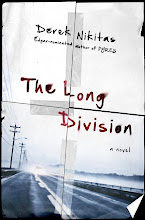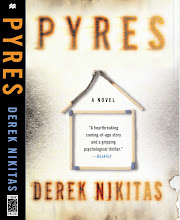Releasing a book--pretty exciting. No shit. Most people can guess some exciting parts: seeing the cover for the first time, reading the first review, seeing it in the bookstore the first time, first autograph. You dream of this, for decades maybe.
There are other, smaller thrills. Ones you might not expect. Like: seeing the font for the first time. Yeah, the font. Important enough that there's a little blurb about it in the back of a lot of books these days. I didn't want my font to be too big. Too big font depresses me. It says: this book isn't as long as it should be, so we're cheating. It says: read fast, tear into these pages, don't linger, no need. But I got good font, turns out.
The ISBN number. A decidedly minor thrill. But something about your book having its own ISBN number is pretty cool. It's very own. Like getting your new baby's social security card in the mail. Unless you fear or hate the government. Then, not so cool. I got no beef with the ISBN agencies, so I like the number. It's nice. It has ten AND thirteen digits. How about that? My book's identity has been established, twice.
Here's one I was actually pretty excited about: finding out what library "subjects" the book would be filed under. You know: the little keywords they used to list under the old card catalogue entries for each book. Some were obvious, like "fiction." But the rest, there's some suspense. I know what the book's about, but what will they think the book is "about." Who are they? The Library of Congress? I don't know. Not that interested, to be honest. I'm sure there's not some guy reading every page of every book and making considered judgments about what two or three words can summarize each.
So here's mine for Pyres: "college professors--crimes against." Sure, it's accurate. There's only one crime against a college professor in the book. Takes place on page fifteen, and then there are 300 more pages. S'okay. I can live with "college professors--crimes against." Freaks me out a little, to be honest. I'm a college professor (well, GTA, but I've been a professor, and hopefully will be again soon). Apparently, you can go into your library's database and look up "college professor--crimes against" and get all sorts of books about it, including mine. This is a whole subject. It's an issue. That bothers me.
On the other hand, I like the way it's written. Not "crimes against college professors," but "college professors--crimes against." The inversion makes it kind of lyrical. Makes you figure there other "college professors--X" subjects. "College professors--degrees of pompousness," "College professors--on sabbatical," "College professors--crimes committed by."
All in all, I don't think I could've done better categorizing my book. There'd be more categories, sure: biker gangs, goths, disgruntled detectives, pregnant criminals, Turkish-American police, Norse mythology, chainsaws--unique uses for, tattoos--bowling pins and skulls.
There are other, smaller thrills. Ones you might not expect. Like: seeing the font for the first time. Yeah, the font. Important enough that there's a little blurb about it in the back of a lot of books these days. I didn't want my font to be too big. Too big font depresses me. It says: this book isn't as long as it should be, so we're cheating. It says: read fast, tear into these pages, don't linger, no need. But I got good font, turns out.
The ISBN number. A decidedly minor thrill. But something about your book having its own ISBN number is pretty cool. It's very own. Like getting your new baby's social security card in the mail. Unless you fear or hate the government. Then, not so cool. I got no beef with the ISBN agencies, so I like the number. It's nice. It has ten AND thirteen digits. How about that? My book's identity has been established, twice.
Here's one I was actually pretty excited about: finding out what library "subjects" the book would be filed under. You know: the little keywords they used to list under the old card catalogue entries for each book. Some were obvious, like "fiction." But the rest, there's some suspense. I know what the book's about, but what will they think the book is "about." Who are they? The Library of Congress? I don't know. Not that interested, to be honest. I'm sure there's not some guy reading every page of every book and making considered judgments about what two or three words can summarize each.
So here's mine for Pyres: "college professors--crimes against." Sure, it's accurate. There's only one crime against a college professor in the book. Takes place on page fifteen, and then there are 300 more pages. S'okay. I can live with "college professors--crimes against." Freaks me out a little, to be honest. I'm a college professor (well, GTA, but I've been a professor, and hopefully will be again soon). Apparently, you can go into your library's database and look up "college professor--crimes against" and get all sorts of books about it, including mine. This is a whole subject. It's an issue. That bothers me.
On the other hand, I like the way it's written. Not "crimes against college professors," but "college professors--crimes against." The inversion makes it kind of lyrical. Makes you figure there other "college professors--X" subjects. "College professors--degrees of pompousness," "College professors--on sabbatical," "College professors--crimes committed by."
All in all, I don't think I could've done better categorizing my book. There'd be more categories, sure: biker gangs, goths, disgruntled detectives, pregnant criminals, Turkish-American police, Norse mythology, chainsaws--unique uses for, tattoos--bowling pins and skulls.



1 comment:
Hmm, sounds like I *need* that book!
Have you sold Australasian rights as well, or should I order it from Amazon? :-)
Post a Comment